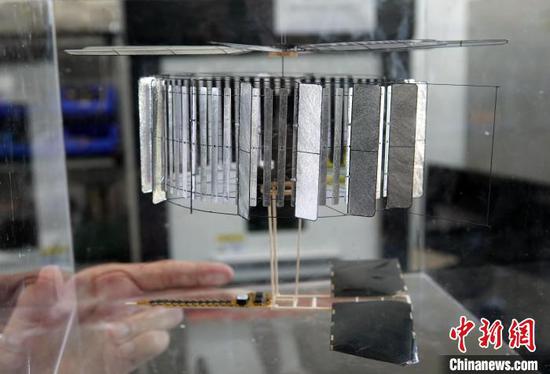Palm-sized drone uses solar power, smashes records

The palm-sized solar-powered CoulombFly drone. (Photo/China News Service)
A palm-sized Chinese drone weighing less than a sheet of paper has captured widespread media attention because its innovative motor allows it to continue flying as long as it receives sunlight.
The solar-powered machine was designed by researchers at Beihang University in Beijing, known for its expertise in aeronautical and astronautical research. It is just a 10th the size of the previous record-holder as the smallest solar-powered aircraft and one 600th of its weight.
Micro aerial vehicles have a host of applications, from environmental monitoring to search and rescue, making them versatile tools. They can perform specialized tasks such as capturing images, detecting objects and transporting items in confined spaces. However, limited flight duration poses a significant obstacle to their usefulness.
Traditional micro aerial vehicles use electromagnetic motors to power their rotors. However, the small motors overheat at high speeds, causing a sharp drop in energy conversion efficiency. Natural sunlight can be a potential alternative as an energy source, but the smaller a drone gets, the less surface area it has to collect sunlight, lead researcher Qi Mingjing said.
In its study, published on Thursday in the journal Nature, the research team said that traditional flying machines weighing less than 10 grams could only stay aloft for up to 10 minutes.
To overcome the efficiency challenges, Qi and his colleagues developed an electrostatic motor that uses the Coulomb force, the force between electrically charged particles at rest, to generate continuous rotating motion. The drone's name, CoulombFly, comes from its unique motor.
A demonstration video presented by the researchers shows that the motor works by creating a circle of electric charges, which generates a twisting force to make a single blade spin like those on a helicopter.
The advantage of such a motor is that it can effectively reduce heat, co-author Peng Jinzhe said.
"This is because static electricity operates at high voltage and low current," Peng said. "The lower the current, the less heat it generates."
The energy conversion efficiency of flying machines weighing less than 5 grams and powered by such static electricity could exceed 10 times that of traditional electromagnetic motors, with less than a 10th of the power consumption required for the same lift, according to the study.
Before the breakthrough, Harvard University researchers published a paper in Nature in 2019 introducing the Robobee aircraft they developed, which was once considered the highest level in the field of micro aerial vehicles. However, it relied on an artificial light source, equivalent to three times the intensity of natural sunlight, for sustained flight.
The CoulombFly can achieve continuous flight solely relying on natural light, representing a significant leap forward, the Beihang researchers said.
After further development, the new drone motor technology is expected to be applied in emergency rescue operations, narrow space detection and other similar scenarios, said Professor Yan Xiaojun, one of the lead researchers of the study.
